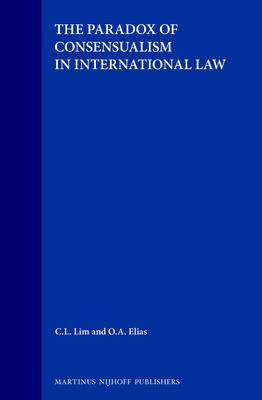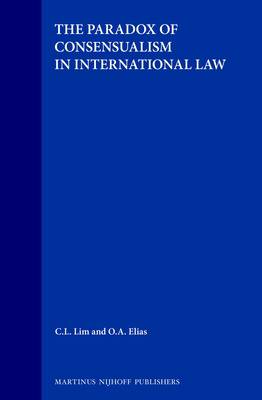
- Afhalen na 1 uur in een winkel met voorraad
- Gratis thuislevering in België vanaf € 30
- Ruim aanbod met 7 miljoen producten
- Afhalen na 1 uur in een winkel met voorraad
- Gratis thuislevering in België vanaf € 30
- Ruim aanbod met 7 miljoen producten
Zoeken
Omschrijving
If international law is derived from the consent of States, who should be in a better position to say what has been consented to than the disputing States themselves? It seems that if the doctrine of consent is taken seriously, there would be no room for an 'objective' legal answer to the question `What is law?'. Furthermore, States do not necessarily employ the same criteria for determining the applicable law when engaged in dispute. And the doctrine of sovereignty is of very limited utility, since not all of substantive international law can be explained in terms of the atomic concept of sovereignty. This leaves consent as the mediating concept between the substantive doctrine of international law on the one hand and the actual practice of States (and others whose practice and participation in the global legal order help shape the body of international laws) on the other.
Nevertheless, this is not to say that there is nothing `higher' than the actual legal claims forwarded by international actors. International law is no mere superstition, since none argue that there is no (one) legal solution. In that sense, the unity of the international legal order is preserved. The problem is that the solutions actually forwarded in dispute are too numerous and international law too abstract to serve as arbiters between the competing claims. Thus, at the level of substantive doctrine there is a fragmentation of that earlier-mentioned picture of unity. But even here, only consent can mediate between unity and fragmentation, stability and change, order and justice, legislation and revolution. The strength of international law lies in its adaptability to political, strategic and diplomatic necessities. To suggest otherwise is to depart from a picture of international law that presumes the empirical verifiability of international laws.
This book has as its principal concern certain orthodoxies of `source thinking' in international law, and is aimed at working out the implications of these. It aims to show how certain theoretical conceptions have shaped the law in action, for good or ill. It will appeal to political theorists, diplomats, global decision-makers, and international lawyers who are interested in the question `What can we do with the international law that we have?', as distinct from the question `What should we do with international law?'.
Nevertheless, this is not to say that there is nothing `higher' than the actual legal claims forwarded by international actors. International law is no mere superstition, since none argue that there is no (one) legal solution. In that sense, the unity of the international legal order is preserved. The problem is that the solutions actually forwarded in dispute are too numerous and international law too abstract to serve as arbiters between the competing claims. Thus, at the level of substantive doctrine there is a fragmentation of that earlier-mentioned picture of unity. But even here, only consent can mediate between unity and fragmentation, stability and change, order and justice, legislation and revolution. The strength of international law lies in its adaptability to political, strategic and diplomatic necessities. To suggest otherwise is to depart from a picture of international law that presumes the empirical verifiability of international laws.
This book has as its principal concern certain orthodoxies of `source thinking' in international law, and is aimed at working out the implications of these. It aims to show how certain theoretical conceptions have shaped the law in action, for good or ill. It will appeal to political theorists, diplomats, global decision-makers, and international lawyers who are interested in the question `What can we do with the international law that we have?', as distinct from the question `What should we do with international law?'.
Specificaties
Betrokkenen
- Auteur(s):
- Uitgeverij:
Inhoud
- Aantal bladzijden:
- 344
- Taal:
- Engels
- Reeks:
- Reeksnummer:
- nr. 31
Eigenschappen
- Productcode (EAN):
- 9789041105165
- Verschijningsdatum:
- 1/01/1998
- Uitvoering:
- Hardcover
- Formaat:
- Genaaid
- Afmetingen:
- 165 mm x 236 mm
- Gewicht:
- 662 g

Alleen bij Standaard Boekhandel
+ 738 punten op je klantenkaart van Standaard Boekhandel
Beoordelingen
We publiceren alleen reviews die voldoen aan de voorwaarden voor reviews. Bekijk onze voorwaarden voor reviews.








